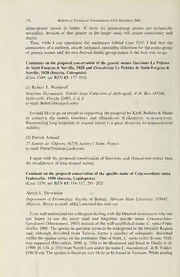
Comments on the proposed conservation of the generic names Gnorimus Le Peletier de Saint Fargeau & Serville, 1828 and Osmoderma Le Peletier de Saint Fargeau & Serville, 1828 (Insecta, Coleoptera) (Case 3349) PDF
Preview Comments on the proposed conservation of the generic names Gnorimus Le Peletier de Saint Fargeau & Serville, 1828 and Osmoderma Le Peletier de Saint Fargeau & Serville, 1828 (Insecta, Coleoptera) (Case 3349)
A ) 274 Bulletin ofZoological Nomenclature 63(4) December2006 genus-group names in limbo. If these six genus-group names are teclinicaliy masculine, fixation of that gender in the larger sense will assure consistency and clarity. Thus, while I can appreciate the sentiments behind Case 3335, I feel that the consistency ofa uniform, strictly technical, masculine definition for the entire group ofgeneric names and the two derived family-group names is the best way to go. Comments on the proposed conservation of the generic names Gnovimus Le Peletier de Saint-Fargeau & Serville, 1828 and Osmodeima Le Peletier de Saint-Fargeau & Serville, 1828 (Insecta, Coleoptera) (Case 3349; see BZN 63: 177-183) Robert E. Woodruff" (1 Emeritus Taxonomist, Florida State Collection ofArthropods, P.O. Box 147100. Gainesville. Florida 32605, U.S. (e-mail: [email protected]) I would like to go on record as supporting the proposal by Krell, Ballerio & Smith to conserve the names Gnorimiis and Osmoderma (Coleoptera, sc.arab.aeidae). Resurrecting long forgotten or unused names is a great disservice to nomenclatural stability. (2) Patrick Amaud 22 Sentier des Clievres, 91250,Saintry I Seine, France (e-mail: [email protected]) I agree with the proposed conservation of Gnorinms and Osmoderma rather than the revalidation oflong-unused names. Comment on the proposed conservation of the specific name of Celaenorrhinus ratna Fruhstorfer, 1908 (Insecta, Lepidoptera) (Case 3339; see BZN 63: 114^117, 201-202) Alexey L. Devyatkin Department ofEntomology, Faculty,ofBiology. Moscow State University, 119992 Moscow, Russia (e-mail: [email protected]) I can well understand mycolleagues dealingwith the Oriental hesperiid.ae who are not happy to use the never used and forgotten specific name Celaenorrhinus kawakamii (Matsumura, 1907) instead of the well-established name C ratna Fruh- storfer, 1908. The species in question seems to be widespread in the Oriental Region and, although described from Taiwan, forms a number of subspecies, described within the species ratna. on the continent. One ofthem, C ratna tytleri Evans, 1926, was supposed (Devyatkin, 2000, p. 210) to be illustrated and Hsted in Osada et al. (1999, pi. 134,p. 221)fromNorth Laos underthename C. maculosus(C. & R. Felder, [1867]) ssp. The speciesis therefore very likely to be found in Vietnam. While dealing
